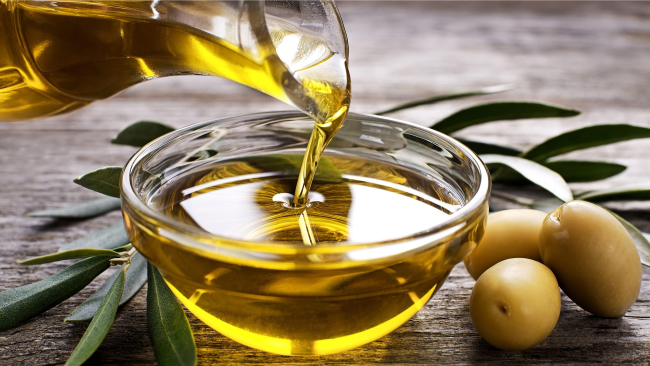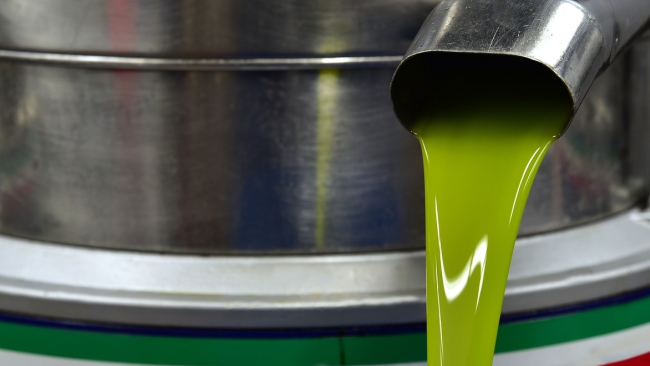Olive oil or olive oil is the oil extracted from the ripe fruit of the olive tree (european oil). The fruit of an olive tree is known as olive or olive.
Pure olive oil is used largely for cooking and food preservation purposes. It is also used in the textile industry to comb wool, in the manufacture of cosmetics, in the pharmaceutical industry for medicinal purposes and in the manufacture of high quality soap.
Most of the world's olive oil supply is produced in the countries of the Mediterranean basin. However, some are also produced in California, South America and Australia.
Youleading olive oil producers are Spain, Italy, Greece and Tunisia.
 In the image, an olive still in the olive tree plantation.
In the image, an olive still in the olive tree plantation.
The types of oil and its different properties
The different degrees of acidity of the oil and associated norms are defined by the International Olive Council. In short, there are four different types of oil:
Extra virgin olive oil
Considered the oil with the best aroma and flavor, the definition of Extra Virgin Olive Oil is very precise with regard to production methods, flavor and chemical composition.
To be certified with the “Extravirgin” label, an oil must meet the following requirements:
- It must come from the first pressing of fresh olives, normally within 24 hours of harvesting;
- It must be extracted by non-chemical or mechanical means and without the use of excessive heat;
- The acidity content must be less than 0.8%;
- It must be free from defects: with perfect flavor and aroma.
 Extra virgin olive oil.
Extra virgin olive oil.
virgin olive oil
This type of oil also comes from the first pressing and must have an acidity level of less than 2%. Therefore, its quality is inferior to Extra Virgin Olive Oil.
Its flavor intensity can vary, being milder than Extra Virgin Olive Oil.
Refined Olive Oil
This type of oil is refined using agents such as acids, alkalis and heat, which serve to extract as much oil as possible from the olive pulp that remains after the first pressing.
The result is a greasier, more acidic oil that has no flavor and no aroma or natural antioxidants.
Therefore, producers need to add a little extra virgin or virgin olive oil to the refined oil, to add some flavor, color and aroma to the mixture.
Pomace Olive Oil (or pure)
Also known as pomace oil or pure olive oil, Pomace oil is the lowest grade of olive oil. It is produced from the by-products of the production of an extra virgin olive oil.
The olive skins, seeds and pulp are heated and the remaining oil is extracted through a solvent called: hexane.
The result is then finalized through the refining process. This type of oil is tasteless and extremely low in antioxidants.
The Benefits of Olive Oil
It's good for heart health: extra virgin olive oil is a rich source of antioxidants and monounsaturated fats, both considered responsible for protecting cardiovascular health;
Decreases stroke risk: Some studies show that a diet rich in olive oil helps dramatically reduce the risk of stroke;
Help in preventing diabetes: extra virgin olive oil helps improve insulin sensitivity, which results in protection against type 2 diabetes;
Increases the nutrients in some foods: Cooking with extra virgin olive oil can help retain the number of nutrients and antioxidants in cooked foods that would otherwise be lost or damaged;
Inhibits A-causing agentslzheimer: Initial research suggests that a diet high in extra virgin olive oil may inhibit the compounds responsible for A diseaselzheimer and by dementia
For all these benefits to effectively help prevent disease, the consumption of extra virgin olive oil must be associated with the adoption of a healthy lifestyle, which includes a balanced diet and the practice of activities physics.
If the patient is diabetic, hypertensive or has heart problems, use should be reduced and guided by a doctor or nutritionist.
How is olive oil produced?
Traditionally, the first stage of oil production starts when the almost ripe olives are ground into a paste.
This procedure was done with large millstones. However, today it is carried out using steel equipment.
The oil then needs to be separated from the bitter, watery liquid that remains in the paste. Traditionally, the paste would be spread on disks stacked on top of each other, then pressed, squeezing out the liquid. This was considered the first press.
The paste would then be mixed with hot water or steam and pressed once more. this oil of second press it wouldn't be as tasty as heat is considered a bad agent for the quality of the oil.
Currently, few mills use this process. Instead, all stages of production are done through the processes of a centrifuge: as water is denser than oil, the equipment separates the two components.
 Centrifugation of olive oil.
Centrifugation of olive oil.
See too:
- Poia;
- Trans fat;
- anointing.
